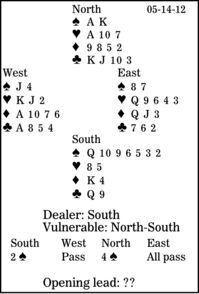Bridge column, May 14: Good lead, great continuation

When on defense at the bridge table, even if you start with the best argument -- opening lead -- you might need to find the correct continuation to defeat the contract.
How can East-West sink four spades in this deal?
With 5 to 10 points and a decent seven-card suit, one would often open three of the suit. But when one is vulnerable against not and is holding a relatively weak suit, starting with a weak two-bid is sensible. North takes a shot at game, hoping his partner is short in diamonds.
First, what should West lead? It is not normal to underlead an ace (lead a low card from a suit headed by the ace), and in this deal it is disastrous. South wins the trick, draws trumps and sets up the clubs. A trump lead does not serve any purpose, so the heart two stands out.
If declarer ducks in the dummy, East should win with his queen and shift to the diamond queen to defeat the contract. Instead, let's suppose that South wins with dummy's heart ace, draws two rounds of trumps and plays a club to his queen. What happens next?
If East has the diamond king, the defenders can cash out -- if they can work out declarer's distribution correctly. But here that does not work. There is only one winning continuation, which is far from obvious. West must lead his heart jack and East must overtake with his queen to switch to the diamond queen.
If you know a pair who could do that, sign them up for your team.
** ** **
COPYRIGHT: 2012, UNITED FEATURE SYNDICATE
DISTRIBUTED BY UNIVERSAL UCLICK FOR UFS

